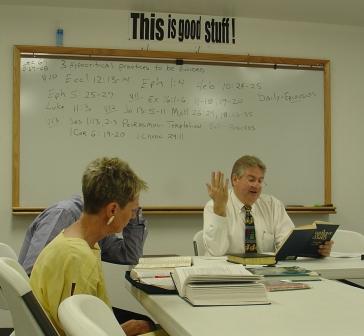Monday, February 20, 2006
Contradiction?
Matt. 8:1, 5-6
1. And when He had come down from the mountain, great multitudes followed Him.
5. And when He had entered Capernaum, a centurion came to Him, entreating Him,
6. and saying, "Lord, my servant is lying paralyzed at home, suffering great pain."
Luke 7:1-2
1. When He had completed all His discourse in the hearing of the people, He went to Capernaum.
2. And a certain centurion's slave, who was highly regarded by him, was sick and about to die.
Barclay gives us some insight as to the Roman idea of the role that the slave/servant played out in society as relates, “Varro, the Roman writer on agriculture, has a grim passage in which he divides the instruments of agriculture into three classes – the articulate, the inarticulate, and the mute, the articulate comprising the slaves, the inarticulate comprising the cattle, and the mute comprising the vehicles. The only difference between a slave and a beast or a cart was that the slave could speak.” We see that this centurion considered this sick servant much more than an expendable tool. Luke tells us that he was highly regarded by him.
Luke 7:3 And when he heard about Jesus, he sent some Jewish elders asking Him to come and save the life of his slave.
Herein lays the difficulty: Luke writes, “And when he [the centurion] heard about Jesus, he sent some Jewish elders asking Him to come and save the life of his slave.” Matthew says that a centurion came to Him. On the surface there appears to be contradiction. Augustine is accredited for the Latin saying, “What one does through others, one does himself.” Matthew reports an abbreviated event from the standpoint of the Jewish elders ultimate origin; the centurion. We compare another passage to gain greater clarity. We view Pilate as he is confronted by the Jewish mob in Matt. 27:24-26 (NKJV) When Pilate saw that he could not prevail at all, but rather that a tumult was rising, he took water and washed his hands before the multitude, saying, "I am innocent of the blood of this just Person. You see to it.'' 25. And all the people answered and said, "His blood be on us and on our children.'' 26. Then he released Barabbas to them; and when he had scourged Jesus, he delivered Him to be crucified. In verse 26 we find “and when he had scourged Jesus;” it is highly unlikely that Pilate performed this task of scourging but commanded those who normally performed this task to do so. The centurion can, and should, be viewed in similar light. In fact the NASB phases this: after having Jesus scourged. There is no contradiction.
1. And when He had come down from the mountain, great multitudes followed Him.
5. And when He had entered Capernaum, a centurion came to Him, entreating Him,
6. and saying, "Lord, my servant is lying paralyzed at home, suffering great pain."
Luke 7:1-2
1. When He had completed all His discourse in the hearing of the people, He went to Capernaum.
2. And a certain centurion's slave, who was highly regarded by him, was sick and about to die.
Barclay gives us some insight as to the Roman idea of the role that the slave/servant played out in society as relates, “Varro, the Roman writer on agriculture, has a grim passage in which he divides the instruments of agriculture into three classes – the articulate, the inarticulate, and the mute, the articulate comprising the slaves, the inarticulate comprising the cattle, and the mute comprising the vehicles. The only difference between a slave and a beast or a cart was that the slave could speak.” We see that this centurion considered this sick servant much more than an expendable tool. Luke tells us that he was highly regarded by him.
Luke 7:3 And when he heard about Jesus, he sent some Jewish elders asking Him to come and save the life of his slave.
Herein lays the difficulty: Luke writes, “And when he [the centurion] heard about Jesus, he sent some Jewish elders asking Him to come and save the life of his slave.” Matthew says that a centurion came to Him. On the surface there appears to be contradiction. Augustine is accredited for the Latin saying, “What one does through others, one does himself.” Matthew reports an abbreviated event from the standpoint of the Jewish elders ultimate origin; the centurion. We compare another passage to gain greater clarity. We view Pilate as he is confronted by the Jewish mob in Matt. 27:24-26 (NKJV) When Pilate saw that he could not prevail at all, but rather that a tumult was rising, he took water and washed his hands before the multitude, saying, "I am innocent of the blood of this just Person. You see to it.'' 25. And all the people answered and said, "His blood be on us and on our children.'' 26. Then he released Barabbas to them; and when he had scourged Jesus, he delivered Him to be crucified. In verse 26 we find “and when he had scourged Jesus;” it is highly unlikely that Pilate performed this task of scourging but commanded those who normally performed this task to do so. The centurion can, and should, be viewed in similar light. In fact the NASB phases this: after having Jesus scourged. There is no contradiction.
